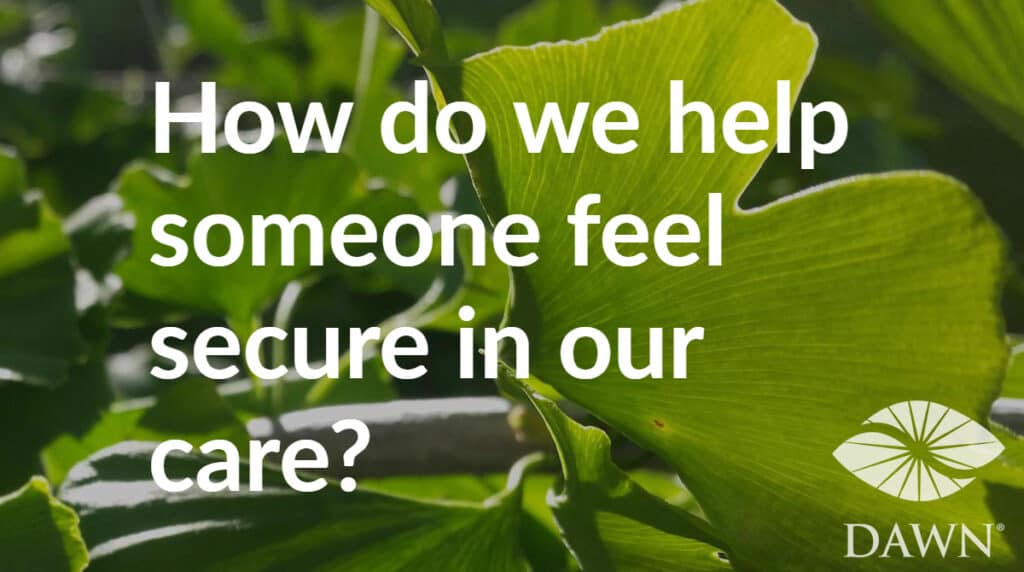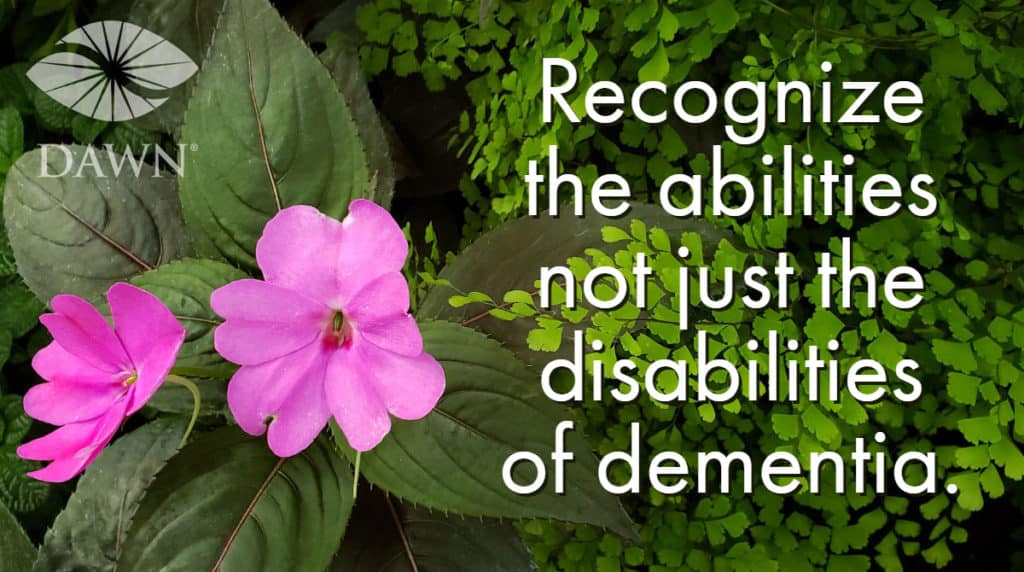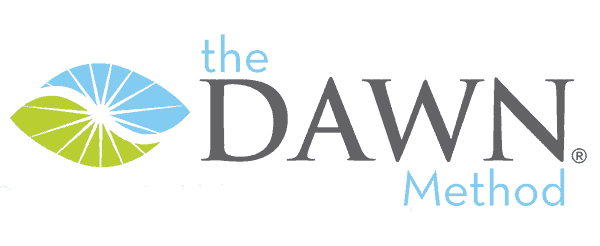
DAWN Dementia Care Specialist Certification Course (DDCS)
Choose the path to less stress and more companionship today! (There is emphasis on the next sentence.)YOU have the power to change the care environment. Become a DAWN Dementia Care Specialist in just 8 weeks and see what a difference it makes.
Purchase nowHow is the DAWN Method different from other dementia certification programs?
There is a revolution happening in the lives of many people experiencing dementia. (There is emphasis on the next sentence.)And it is because of their caregivers. Dementia caregivers trained in the DAWN Method have the ability to change the dynamics of almost every situation.
The DAWN Method is a mindful way of being and interacting that gets to the heart of what is going on when dementia or Alzheimer’s comes into someone’s life. Our goal is not to hand out bandages for “behaviors,” it is to teach you how to empathize and support a person with dementia emotionally in concrete ways.
You can revolutionize the care environment.
How does it work?
Using the DAWN Method, you can create an environment of peace and safety, of laughter and camaraderie… Let us help you make that change.
Our online dementia certification course in the DAWN Method will help you to first better understand dementia and the skills that are kept and lost when someone is experiencing it. You will learn new tools and techniques that you can use to support someone living with dementia emotionally and enhance their well-being.
The Good News about Dementia Care
To get a taste of what the DAWN Method addresses, watch our animated video in which we explain the good news about what dementia does NOT take away.
Because you want your clients to feel safe.

I’m a pretty empathetic person. Can’t I just use my intuition?
The odds are against you if you rely on your gut. Working with people who are experiencing dementia requires a new way of interacting. Caregivers (even incredibly empathetic ones), who don’t truly understand this will inadvertently embarrass, frustrate and undermine their clients.
If you have worked in the memory care space for any length of time you know this and have experienced this. It’s not our fault, but if we want our clients to learn to trust us, we need to learn to interact in a new way.
How will I benefit as a caregiver?
Caregivers trained as certified DAWN Dementia Care Specialists experience less stress and more peaceful times with their dementia clients. They have more confidence knowing that they have concrete tools to help them navigate the day to day tasks and interactions that are a part of caring for someone who is experiencing dementia or Alzheimer’s.
Learn how to:
- Understand why strength-based, person-centered dementia care is so effective
- Manage interactions so that your client can stay relaxed and enjoy the present
- Capitalize on the thinking skills dementia patients will not lose
- Maximize your client’s level of functioning
You will help your companion’s wellbeing.
- They will learn to feel:
- more safe and secure
- more valued and respected
- more happy and relaxed
- They will begin to feel:
- less embarrassed
- less confused
- less upset
- You will learn to:
- avoid unintentionally hurting their feelings
- avoid inadvertently confusing them
- avoid unintentionally embarrassing them
Because you want your clients to feel secure.

What is a strength-based, person-centered approach to dementia & Alzheimer’s care?
The medical model of dementia and Alzheimer’s care used widely at present is largely based on the model of “fix the patient,” yet we know there is no “fix” for dementia. What if we rethought our model of care? What if we focused on what people experiencing dementia can do, rather than what they cannot do? This is the foundation of the DAWN Method—a strength-based approach to dementia care. Because, can we really be person-centered if we don’t understand what a person can and cannot do?
Because there is a way to happier days.

Who is behind the DAWN Method?
Judy Cornish is an author, founder of the Dementia & Alzheimer’s Wellbeing Network (DAWN®), creator of the DAWN Method® of dementia care, a former owner of a dementia home care agency, and a retired elder law attorney. Her two books (The Dementia Handbook and Dementia With Dignity) take person-centered care from theory to practice by identifying the skills not lost to dementia. Through DAWN, Cornish provides online training programs for families and professional caregivers, as well as staff training for agencies and facilities. Her goal is to see dignified dementia care become available for all.
What is the DAWN online dementia certification course like?
- Eight lessons of 3 to 7 video topics (total of 36 videos)
- Videos are between 10-20 minutes each
- Accompanying quizzes with 10-20 questions each (must pass at 100%, but you may retake as many times as needed)
- Eight-week program***
- Certification is valid for 2 years
- Investment: $1,600.00
- Recertify after 2 years for $49.00
***We recommend that you complete no more than one video topic and quiz per day. (Most caregivers complete the course in about eight weeks.) (There is emphasis on phrases in the next sentence.)This is important so that you have time to absorb the information and make the necessary mind shift, as well as have some time to try out the new tools and techniques one at a time with your client(s). Caregivers who take the time to do this will be more solid in their understanding at the end of the dementia care coursework.

What DAWN Dementia Care Specialists are saying…
“I work with a client who has many caregivers, but only two of us use the DAWN method. When we DAWN caregivers have a shift immediately following some of the others, we find her more confused and anxious, voicing her despair about how “stupid” she is. As a DAWN caregiver, I know my job is to protect her dignity and help her live her life at her own pace, in the comfort of any fond memories she is able to retain. When I use the DAWN tools that are habilitative and person-centered care, and can be so easily learned and applied, it restores her wellbeing.”

D.W., DDCS
Professional caregiver in Washington state
“I feel honored to have the ability to care for these clients. Your training course gives me the confidence to face each day with them. While I feel that I am still learning, there is comfort in knowing I have a resource to rely on. Thank you for that!”

Rebecca A., DDCS
Professional caregiver in Washington state
“Amazing, life changing material. Judy teaches with such love and compassion. I wish we had known about this when my father had dementia. It would have made his last years so much easier and more peaceful, rather than filled with stress and strife.”

J.S., DDCS
Professional caregiver in Idaho

What’s included and how will I benefit by becoming a certified DAWN Dementia Care Specialist?
Personal Benefits
- Less stress
- Increased confidence knowing you have the DAWN tools and techniques to help you
- Better relationships with clients
- Satisfaction at having improved the life of your client experiencing dementia
Professional Benefits
- Expertise in strength-based, person-centered dementia care
- Consultation and problem-solving with DAWN Trainers
- Nationwide recognition as a DAWN Dementia Care Specialist (DDCS)
- Employment referrals from the DAWN Network for caregivers seeking employment who have completed their DDCS certification
- Gratitude from family members as they see positive changes in their loved one’s well-being
- Ability to offer specialized dementia care services at an increased hourly rate
Course Material
Our DAWN dementia and Alzheimer’s training for caregivers will teach you to recognize the specific cognitive skills that are kept and those that are lost as a person experiences dementia. The lessons also provide the specific tools and techniques of the DAWN Method that you can use with your clients to support them emotionally and help them recover a sense of well-being. Throughout the course Judy gives real life examples.
The online course lessons
- Understanding Dementia and DAWN Strength-Based Care
- Mood Management (Tool #1)
- Security in Confusion (Tool #2)
- Security in Care (Tool #3)
- Social Success (Tool #4)
- Sense of Control (Tool #5)
- Sense of Value (Tool #6)
- Secure Future (Tool #7)
Lesson 1: Understanding Dementia and DAWN Strength-Based Dementia Care
The videos in the first lesson of the DAWN dementia and Alzheimer’s certification course will develop your understanding of the changes dementia brings and how to work with the person’s changing sense of realty. You will see how a skills-based approach to dementia or Alzheimer’s will empower both you and your client.

After introducing herself and the DAWN Method in the first video, Judy Cornish will go on to describe what dementia is in more depth and what usually happens when someone is diagnosed with dementia. You will begin to understand what a medical approach is and why it doesn’t make sense in the case of dementia care.
Toward the end of the introduction, Judy will outline the cognitive skills we all have at our disposal when not experiencing dementia. It is important for caregivers to get a solid grasp of these skills and which ones will fade as dementia progresses. In Topics 1.2 – 1.4, you will get in-depth explanations of each set of skills. If you’d like to read more about them now, check out our blog article that summarizes the three pairs of skills kept and lost to dementia: What is the DAWN Method of dementia care?
In the last three topics from Lesson 1, Judy will explain why strength-based, person-centered care works so well as well as how it is different from the traditional Western model of reality orientation. She will also cover what to do when a person with dementia is resistant to accepting help as well as the difference between dementia and the memory loss that everyone will experience as a part of normal aging.
FAQs
The course investment is $1,600.00 for a two-year certification. You may recertify every two years for $49.00.
Every two years. If you call yourself a DDCS, or DAWN Dementia Care Specialist, then you must recertify every two years.
We recommend that you complete no more than one video topic and quiz per day. (Most caregivers complete the course in about eight weeks.) (There is emphasis on phrases in the next sentence.) This is important so that you have time to absorb the information and make the necessary mind shift, as well as have some time to try out the new tools and techniques one at a time with your client(s). Dementia caregivers that take the time to do this will be more solid in their understanding at the completion of their dementia care certification.
Many people find the quizzes to be quite challenging. Judy designed the questions in a way that forces the learner to use their intuitive thinking skills, not just their memory skills (meaning that you have to think about what you’ve learned and then apply it – you cannot just listen, memorize and repeat information). That being said, you do get to look at your answers to see which questions you answered incorrectly each time you take a quiz. If you take the time to think about why you answered a question incorrectly, your understanding will advance to a new level. All certified DAWN Dementia Care Specialists must pass each quiz with a score of 100%.
No, you don’t. This course is meant for individual caregivers who are working with dementia clients but it is open to anyone. We have even had a few family members ask to take it in order to get a more solid understanding of the DAWN Method. (NOTE: Most families choose DAWN HomeCare or Private Dementia Care Training instead.)
Yes. At the completion of the dementia care certification, you will be emailed your certificate which you may choose to print. Each certificate holder has a unique number printed on their certificate.
Yes. Please contact us and we can check to see if the person’s dementia certificate is valid and when it will expire.
This is something that you will learn about in depth in the first lesson of the DAWN Method. We have two thinking systems, which are usually referred to as intuitive thought and rational thought. These two systems are explained by psychologist Daniel Kahneman in his book, Thinking, Fast and Slow. He calls them System 1 (intuitive, or fast thinking) and System 2 (rational, or slow thinking). Iain McGilchrist, a renowned neurologist as well as psychologist and philosopher, provides a deeper look into the neurological bases of our thinking skills in his book, The Master and His Emissary.
Intuitive thinking is our most essential set of thinking skills. It happens automatically (hence quickly), gathering raw data via our senses, and is not lost to dementia. People experiencing dementia are still learning through intuitive thinking even though they are losing specific memories. This is why they will not want to be with a caregiver who has made them feel bad in the past, even though they cannot remember why that might be—they will have learned that they are not safe with that person.
Rational thinking is our secondary system. It organizes the information gathered by our intuitive thinking into stories that make sense of what’s happening around us. As dementia progresses, we begin to lose our rational thought skills. We become unable to understand explanations, make plans, follow sequences, or even understand cause and effect. If we dream about a loved one who has died, we won’t be able to understand that it was a dream, and will wonder where they are when we awake. When we are losing our rational thinking to dementia, we need our companions to help us feel safe in the present.
The concept of our two selves, again one described by Daniel Kahneman, explains what it means to lose our memory skills. We continue to fully experience the present via our senses (receiving both positive and negative sensory input) but lose the ability to access information about the past, leaving us with too little information to accurately interpret what we are experiencing. This is why our sense of reality becomes increasingly inaccurate. This is why we cannot recognize those familiar objects around us and think we are not at home. We need our companions to bring positive sensory experiences to us, and to help us feel safe even though we cannot feel at home.
Yes. Please go to our DDCS inquiry form and send us a message. We would be happy to answer your questions.
More testimonials…
“When I have the privilege of giving even glimpses of the DAWN method to a family, it’s as if they get to take a deep breath for the first time in a really long time.”

Jill Couch, OT, DDCS, DAWN Trainer
Professional caregiver & owner of Better People Care in Fort Collins, CO
“I have a lot of experience in caregiving and working with seniors. I have found the DAWN tools to be very helpful. One of the tools is mood management. I have a client who is often frustrated by not being able to find the words she wants to say. When we get in my car, I point out the beauty in the sky and clouds, describing them for her, and then tell her they remind me of a favorite song. We start singing “There’s a Blue Sky Way Up Yonder.” Singing is her happy place, where she can experience a positive mood. When I tell her that she taught me a cowboy song back when I first knew her and we begin singing it, she always feels so good to have given me something beautiful, too.”
The DAWN tool of social success has worked so well with another client. When she and I are out, we often meet a friend of hers from church. At first, her friend would constantly ask her questions and she would become very nervous and embarrassed. Using the social success tool, I began to ask the friend questions and get the friend to open up and tell us about herself and her friendship with my client. Soon my client’s friend learned to look at her and include her in what she was saying, but not ask questions. My client now greatly enjoys meeting this friend, loves having conversations with her, and no longer feels threatened.”

Megan B., DDCS
Professional caregiver in Idaho
“Being a caregiver is one of the most rewarding jobs there is. But without a compassionate and understanding method like the DAWN Method, it can be difficult to find the source of the behavior and turn it into something positive in a loving manner. I have a client who is very determined to feel in control. I use the tools of the DAWN Method every day with her. It took a few months, but she now feels completely in control in several areas, despite her dementia. Before I had been trained in the DAWN Method, I had nothing but common sense and compassion guiding me. Now I feel that with creativity and the DAWN tools I can help anyone who needs care.”

Erica R., DDCS
Professional caregiver in Idaho
“To us, as DAWN dementia care professionals, it seems so normal that our clients can rely on their intuitive thought processes and lead happy lives. Yet most caregivers think people with dementia or Alzheimer’s are angry and difficult. Not our clients! The DAWN Method brings happiness. The classes we offer will change your life and the life of your loved one.”

H.S., DDCS
Professional caregiver in Idaho



